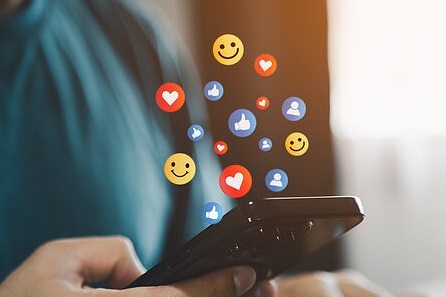Last Updated on January 12, 2025 1:14 pm by INDIAN AWAAZ
Screen time duration and emotional alteration due to social media exposure could also potentially increase blood pressure.

AMN / HEALTH DESK
A recent study has revealed that addiction to short-form videos on social media platforms can lead to high blood pressure and hypertension. The study, published in European Heart Journal – Digital Health, a journal of the European Society of Cardiology, indicates that low levels of radio frequency energy emitted from mobile phones have been linked with an increase in blood pressure and hypertension.
The team analysed data from 4,318 young and middle-aged people who self-reported screen time spent watching short videos at bedtime. The report also highlighted that screen time at bedtime was significantly associated with essential hypertension in young and middle-aged people.

People use social media for a variety of purposes. Some people only connect with friends and family. While some follow news outlets to connect with headlines and current events. People who like the connectivity it brings would sing its praises when explaining the convenience.
However, there are emerging risk factors that have come from the explosive use of social media- and they aren’t all related to cyber-bullying.
Yes, Facebook, Twitter, and Instagram can wear you out, says Dr. Patricia Bratt, a therapist, and psychoanalyst with offices in Livingston and New York City.
“Social media can run the gamut from being fabulously uplifting to being totally depressing and exhausting,” says Bratt. Dr. Bratt is also the director of trauma and resilience studies at the Livingston-based Academy of Clinical and Applied Psychoanalysis. “And this applies to all ages.”
The Pew researchers recently uncovered trends that have heretofore gone unnoticed in the world of social media.
Having a constant stream or “Newsfeed” scrolling before your eyes expose you to not just happy moments, but also terrible news, drama, and other stressors that people wouldn’t normally experience elsewhere.

Social Media Affecting Teens Too
In a study published in the Journal of School Nursing, researchers found that teens who spent at least 14 hours a week on the Internet had elevated blood pressure. Of 134 teens described by researchers as heavy Internet users, 26 had elevated blood pressure.
This is believed to be the first study to show a link between time spent on the Internet and high blood pressure. The findings add to growing research that has shown an association between heavy Internet use and other health risks like addiction, anxiety, depression, obesity and social isolation.
Andrea Cassidy-Bushrow, Ph.D., MPH, a researcher at Henry Ford’s Department of Public Health Sciences and the study’s lead author, says the take-home message for teens and parents is moderation.
“Using the Internet is part of our daily life but it shouldn’t consume us,” she says. “In our study, teens considered heavy Internet users were on the Internet an average of 25 hours a week.
